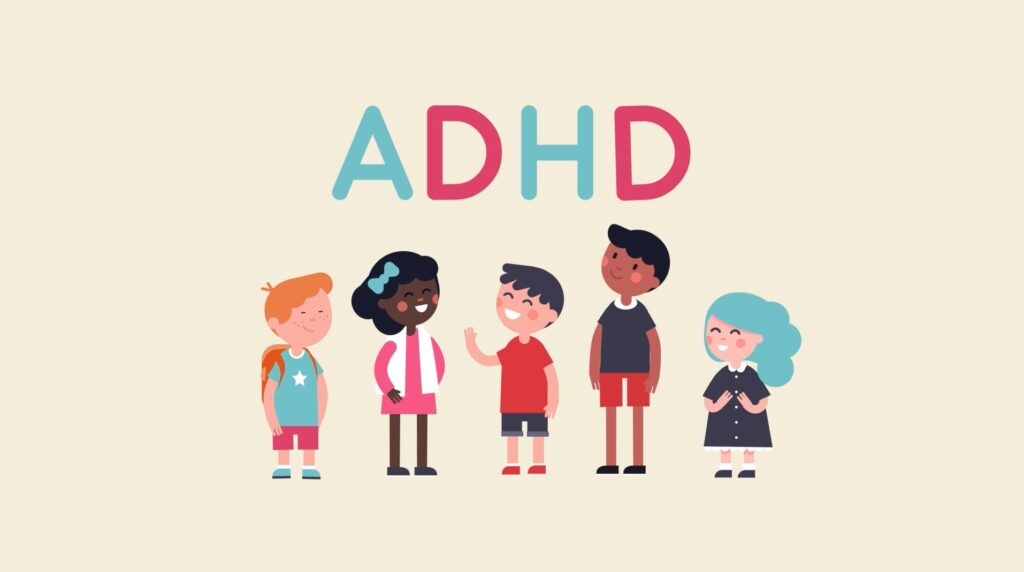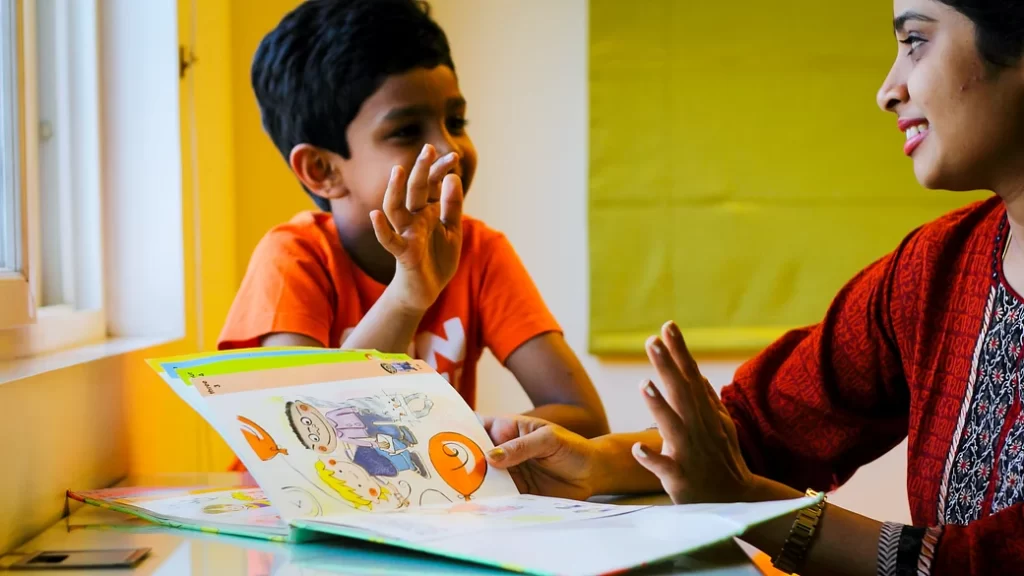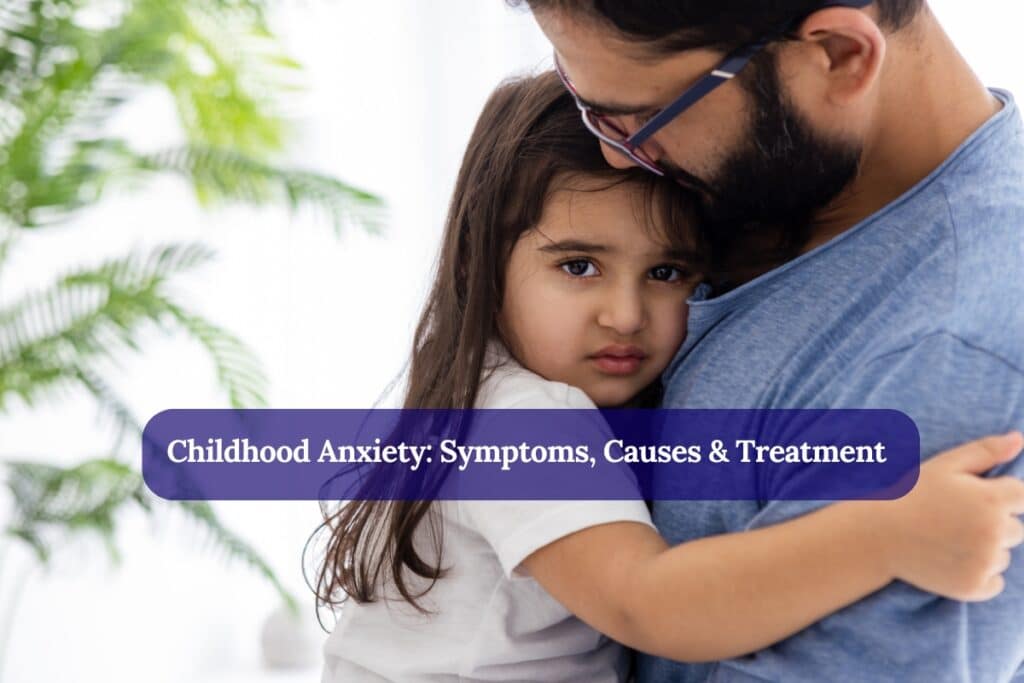Hi, I’m a child psychologist at PsychiCare. I work with children who struggle with emotions, behavior, and trauma. Many parents worry when their child seems sad, anxious, or withdrawn. Some even consider therapy, but kids don’t always have the words to explain their feelings.
Studies show that 1 in 6 children between ages 2-8 has a mental, behavioral, or developmental disorder. Yet, traditional therapy often relies on talking, which can be hard for young minds.
This is where play therapy helps. Instead of words, children use toys, art, and games to express their thoughts and feelings. Research shows it improves behavior, reduces anxiety, and helps kids process tough experiences in a way that feels natural and safe.
Let’s explore how play therapy works and how it can help your child.
Why Play Therapy?
Young children don’t always understand or express their emotions the way adults do. They live in the moment and may not have the self-awareness needed to talk about their feelings. That’s why traditional therapy isn’t always effective for them.
Play therapy works because children naturally express emotions through play. While playing, they reveal their fears, worries, and struggles without even realizing it. This gives therapists a clear view of what’s going on inside their minds.
Unlike parents, whom kids may try to please or avoid disappointing, a therapist in a play session is seen as a neutral figure. Sometimes, children even see them as a playful challenger, which makes it easier for them to open up.
Play therapy creates a safe space where kids can express themselves freely—without pressure, fear, or judgment.
How does Play Therapy work?
In a play therapy session, a therapist uses toys, games, and creative activities to help a child express emotions. Instead of asking direct questions, they might say, “Is the puppet feeling happy?” or “Why is the doll sad?”. This helps kids communicate feelings they may not be able to put into words.
Therapists also talk to parents and teachers to understand the child’s daily behavior. They observe how a child reacts when a parent is present versus when they are not.
Another key part of play therapy is watching how kids interact with different toys, colors, and activities over multiple sessions. These reactions give clues about their emotions, fears, or struggles.
Using all these insights, the therapist creates a personalized therapy plan to help the child heal and cope better with their feelings.
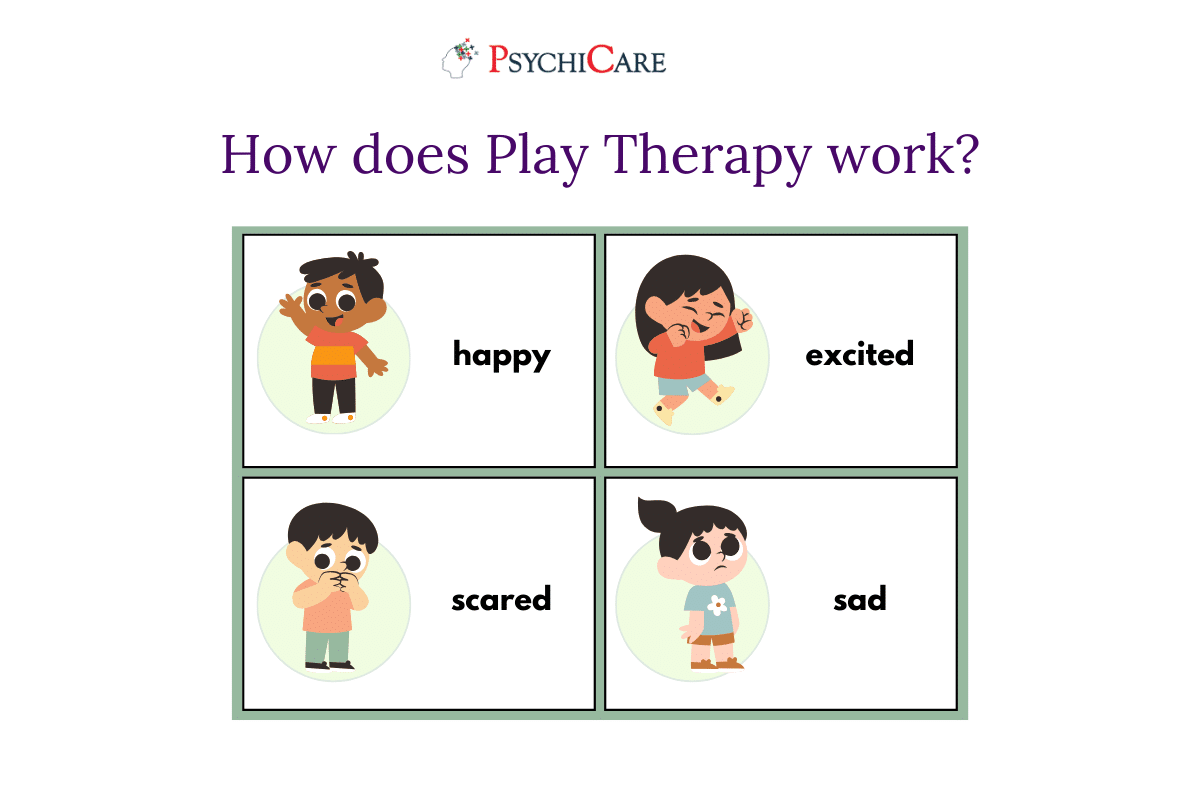
Examples of play therapy
In play therapy, the therapist may choose the games or let the child decide. The goal is to create a safe space where the child can express emotions naturally. Some common play therapy techniques include:
- Dolls and Puppets – The therapist asks the child to act out a typical day or a difficult experience. This helps reveal their feelings about family, school, or personal struggles.
- Storytelling – The child is encouraged to make up a story. The details they include, the characters they create, and the way the story unfolds provide insight into their thoughts and emotions.
- Drawing and Painting – Art allows children to express feelings they may not have words for. A therapist can analyze colors, shapes, and themes in their drawings to understand their emotions.
- Building and Role-Playing – Playing with blocks, cars, or pretend play (like a doctor-patient scenario) can help children act out their inner world and fears.
Types of Child Play Therapy
Play therapy comes in different forms, each designed to support children in unique ways.
Directive Play Therapy – The therapist guides and structures the session using specific toys or activities to help the child address challenges. This works well for children who need more direction.
Non-Directive Play Therapy – Also called child-centered play therapy, this approach lets the child take the lead, while the therapist provides a safe, accepting space for self-expression and self-discovery.
Filial Play Therapy – Parents or caregivers actively participate in therapy. They learn play techniques from the therapist and use them at home to strengthen their bond with the child and improve communication.
Group Play Therapy – Small groups of children play together in a social setting, helping them develop social skills, empathy, and a sense of belonging.
Sandplay Therapy – A child creates a mini world using sand and small objects. This symbolic play helps express deep emotions and access the subconscious.
Expressive Arts Therapy – Uses drawing, painting, sculpting, and storytelling to help children communicate their emotions creatively.
Cognitive-Behavioral Play Therapy (CBPT) – Combines play with cognitive-behavioral techniques to help kids recognize and change negative thought patterns. Useful for anxiety, depression, and behavioral issues.
Animal-Assisted Play Therapy – Involves trained therapy animals to create a calming and supportive environment. Animals help children feel safe, regulate emotions, and express feelings more freely.
Drama Therapy – Uses theatrical role-playing to help kids act out emotions, explore challenges, and gain new perspectives.
Theraplay – Focuses on parent-child bonding through structured play activities that build trust, attachment, and emotional security.
Art Therapy – Encourages children to express emotions through painting, drawing, and other art forms, helping them process feelings in a creative way.
Narrative Play Therapy – Uses storytelling and imaginative play to help children make sense of their experiences, develop problem-solving skills, and build resilience.
Play Therapy for Trauma – Designed for children who have experienced trauma, this therapy provides a safe space to process emotions, build resilience, and heal.
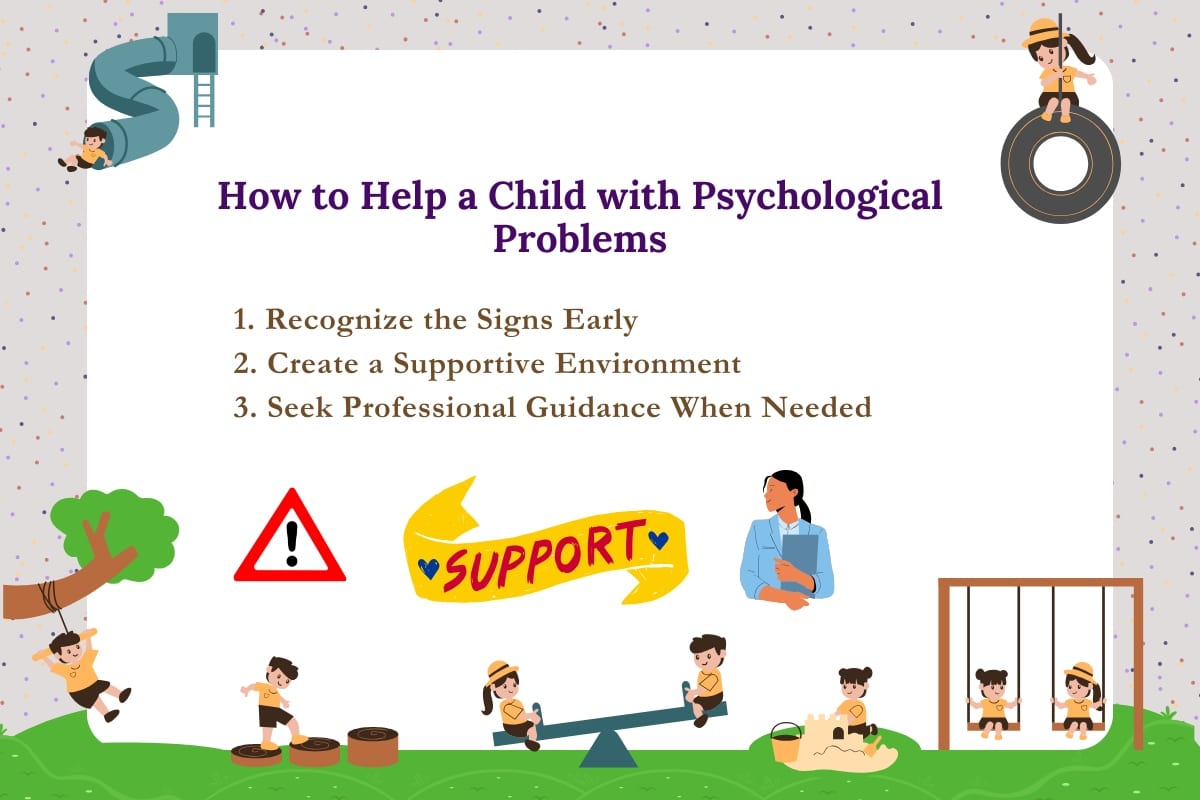
How to Help a Child with Psychological Problems:
1. Recognize the Signs Early
Children often struggle to express their emotions, so changes in behaviour can be the first clue. Look out for:
- Withdrawal – If a child who once loved playing outside now prefers to stay alone in their room, they might be struggling emotionally.
- Aggression or Mood Swings – Frequent tantrums, hitting siblings, or sudden outbursts over small things can signal deeper issues.
- Excessive Fear or Anxiety – If your child refuses to go to school or is scared of things they were once comfortable with, like bedtime or social gatherings, they may need support.
- Drop in Academic Performance – A once high-achieving student suddenly losing interest in studies could be facing emotional distress.
📌 Real-Life Example:
Sarah, a 7-year-old, started avoiding family dinners and lost interest in her favourite cartoons. Her parents initially thought she was just being moody, but after talking to her teacher, they realized she was being bullied at school. Addressing the issue early through play therapy helped Sarah regain confidence.
2. Create a Supportive Environment
Children thrive in a home where they feel safe, loved, and heard. Here’s how you can help:
- Encourage Open Conversations – Instead of asking, “What’s wrong?” try, “I noticed you seem sad lately. Do you want to talk about it?”
- Validate Their Feelings – If a child is scared about a test, don’t say “Don’t worry, it’s just a test.” Instead, acknowledge their emotions: “I understand you’re nervous. Let’s find ways to help you prepare.”
- Create a Comforting Routine – Consistency in daily life can help children feel secure. Bedtime stories, playtime, and mealtime talks can make a big difference.
📌 Real-Life Example:
8-year-old Liam started having nightmares after his parents’ divorce. Instead of forcing him to sleep alone, his mom introduced a bedtime storytelling routine. This helped Liam open up about his feelings and improved his sleep.
3. Seek Professional Guidance When Needed
If a child’s struggles persist or interfere with daily life, reaching out to a professional can be life-changing. Options include:
- Play Therapy – A trained therapist might use dolls, sand play, or storytelling to help the child express emotions they can’t verbalize.
- Counselling for Parents – Sometimes, parents also need guidance on how to support their child emotionally.
- School Support – Teachers, counsellors, and special education programs can play a crucial role in helping children cope.
📌 Real-Life Example:
10-year-old Jake had severe anxiety about making friends. His parents enrolled him in group play therapy, where he slowly learned social skills by interacting with kids in a controlled, playful setting. Today, he feels more comfortable making new friends.
4 Problem-Solving Strategies in Psychology:
Helping children navigate their emotions and challenges requires effective problem-solving strategies. Here are four key psychological approaches that can make a difference:
1. Cognitive Restructuring: Changing Negative Thoughts
Children sometimes develop negative thought patterns that affect their emotions and behaviour. Cognitive restructuring helps them replace irrational fears with more positive and realistic thoughts.
🔹 Example: Emma, a 9-year-old, believed “Nobody likes me at school.” With the help of her therapist, she learned to challenge this thought by recalling moments when classmates invited her to play. Over time, she started feeling more confident in social situations.
2. Behavioral Techniques: Encouraging Positive Actions
Using behavioral strategies like positive reinforcement helps shape good habits. Instead of punishing bad behavior, this approach rewards positive actions, encouraging children to repeat them.
🔹 Example: Max, who struggled with completing homework, was given a reward chart. Each time he finished his work on time, he earned a star. After earning five stars, he got to pick a fun weekend activity. This made homework more motivating for him.
3. Social Skills Training: Building Healthy Interactions
Many children struggle with making friends, resolving conflicts, or understanding emotions. Social skills training teaches them essential communication and empathy skills.
🔹 Example: Lily had trouble taking turns while playing. In therapy, she practiced role-playing games where she learned to wait, listen, and share. Soon, she started making more friends on the playground.
4. Coping Skills Development: Managing Stress and Emotions
Teaching kids healthy coping mechanisms like deep breathing, journaling, or drawing helps them manage stress and anxiety effectively.
🔹 Example: Whenever 7-year-old Jake felt angry, he would throw his toys. His therapist taught him a “cool-down corner” strategy where he could color or listen to calming music when frustrated. Over time, he learned to manage his anger without outbursts.
FAQs:
How long does play therapy typically last?
The duration of play therapy varies depending on the individual needs and progress of the child. It can range from several weeks to months or even longer, depending on the complexity of the psychological problems.
Can parents participate in play therapy sessions?
Parental involvement in play therapy can be valuable. While children engage in individual sessions, therapists often provide feedback and guidance to parents, enabling them to support their child’s emotional well-being outside of therapy.
Are all psychologists qualified to conduct play therapy?
Not all psychologists are specifically trained in play therapy. It is important to seek out licensed psychologists or play therapists who have undergone specialized training in this approach.
Can play therapy benefit children with specific developmental disorders?
Yes, play therapy can benefit children with various developmental disorders. It provides a structured and supportive environment to enhance communication skills, social interactions, and emotional expression, tailored to the specific needs of each child.
Conclusion
In conclusion, play therapy is a great way to help children understand their feelings and cope with problems.
By creating a safe and supportive space, getting professional help when needed, and using simple strategies like positive thinking, good behavior rewards, social skills training, and coping exercises, we can help children feel better, grow stronger, and handle life’s challenges with confidence.
When kids feel loved and understood, they can express themselves more easily and build a happier future.

